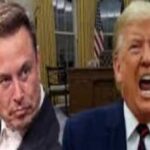New restrictions on rare earth magnets and related materials imposed by China are starting to bite. Hamamatsu-based small car maker Suzuki Motor’s plans to suspend the production of its flagship Swift compact hatchback due to China’s rare earth restrictions, becoming the first Japanese automaker to be impacted by the export curbs.
Suzuki halted production of the , excluding the Swift Sport version, from May 26 citing a shortage of components, Reuters said in a report, adding that plans to resume output have been pushed back several times. Suzuki now expects a partial restart of production on June 13 with full resumption after June 16, as the “prospect of parts supply is clearer” now, the carmaker said in a statement.
The restrictions on rare earth magnets and related materials imposed by China kicked in from April 4, as a direct response to US imposing tariffs. This is , including electric vehicle manufacturers in India. , Suzuki’s subsidiary in India, said earlier this week that there was no immediate impact of China’s restrictions on rare earth magnets, and that the industry was in discussion with the government on the matter, which has been “receptive” and “supportive”.
EV makers are particularly impacted by the Chinese restrictions, facing potential shortage of the critical components, which raises concerns of price hikes and production delays in a nascent, cost-sensitive segment of the auto market. The Indian car industry has initiated a conversation with the government to smoothen the process for procuring the rare earth magnets from Beijing. While the Chinese government has not imposed an outright ban on the export of rare earth magnets — a crucial element in making EVs — the process has been made very difficult, causing protracted delays and posing shortage risks.
Why are rare earth magnets important for EV makers
Rare earth magnets, especially neodymium-iron-boron (NdFeB) magnets, are crucial for EV manufacturing, particularly in electric motors. They provide the strong magnetic fields needed for efficient and powerful electric motors, including traction motors that drive EVs. These magnets also play a major role in other EV components like power steering systems, wiper motors, and braking systems. China has a near monopoly over these rare earth magnets.
A senior executive from the Indian car industry told that importers are now required to give their Chinese suppliers an undertaking that the rare earth magnets procured from that country would only be used in vehicles and not for defence or military applications.
Over the past month or so, Indian carmakers are learnt to have used up inventories and there is likely to be a shortage going forward.
Worrying still is a fresh insistence from Beijing that instead of sourcing magnets separately, carmakers buy entire electric motor assemblies from Chinese companies, or simply wait for the Chinese authorities to issue export permits to local rare earth magnet producers, as has been done, according to Reuters, for at least four magnet producers that include suppliers to Volkswagen — the first granted since Beijing restricted shipments last month. The German carmaker is said to have lobbied hard with Beijing to get this done.
Sourcing entire motor assembly
The problem with sourcing entire motors, as against just the magnets in them, is that carmakers would have to redesign their cars to accommodate the entire motor assembly, which comes in standard sizes. The ability to import magnets meant that manufacturers could calibrate the motor sizes to the design of their vehicles.
While the availability of rare earth metals is not limited to China, it is in the efficient processing of these critical elements where Beijing has a substantial lead, which was once enjoyed by the US and Japan.
In recent years, Japan has been able to restart some of its mineral processing industry owing to government policies, but countries like the US and India are heavily dependent on Chinese exports of these metals.
In response to the US administration’s reciprocal tariff heat, China restricted exports of seven heavy rare earth metals including samarium, gadolinium, terbium, dysprosium, lutetium, scandium, and yttrium, as well as rare earth magnets.
Earlier, it had also banned exports to the US of gallium, germanium, antimony, and other key high-tech materials with potential military applications. It is not clear if the recent thaw in US-China trade talks, including a pause, is going to affect these supplies.








